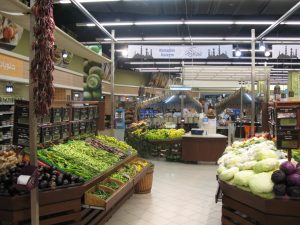 Food scarcity is becoming a worldwide problem due to a long-lasting drouth in 2012 and constantly increasing population. In the barren lands of the Middle East, Dubai has the heavy task to provide enough food for the entire region. As a result, the city is one of the most important hubs for food production and re-export.
Food scarcity is becoming a worldwide problem due to a long-lasting drouth in 2012 and constantly increasing population. In the barren lands of the Middle East, Dubai has the heavy task to provide enough food for the entire region. As a result, the city is one of the most important hubs for food production and re-export.
In July, the Department of Economic Development (DED) announced that 13.2% of the area’s GDP comes from the manufacturing sector. That is equal to about $10.5 billion, making the sector the fourth most prosperous after retail and repair, distributing trade; storage, transport and communication; business activities and real estate.
The UAE’s capacity to produce fresh food is quite limited. The land in the country that is cultivated is estimated to be less than 1%. All of the emirates emirates, including Dubai, import about 90% of the needed food and nearly all fruits and vegetables that are consumed in the region. However, one of the main industries in Dubai is the food sector due to the cities unique position as a trading hub.
But despite the fact that Dubai doesn’t produce much food, it still plays an important role in the area’s food sector. Moreover, the emirate is the third biggest food re-exporter in the world. It provides food not only to its neighboring countries, but also to many regions in Africa and Asia. The constant expansion of the food sector of Dubai is attributed to the city’s excellent logistic infrastructure, geographic location and its wide sea and air route network. Dubai successfully utilizes its assets and constantly invests in storage and logistics facilities. In addition, the region attracts more investors by building dedicated industrial centers which include special areas for food and beverage trade.
Elsewhere, the economy of Iraq is now starting to restore its power. This means that the food industry in Dubai will continue to profit from the growing buying power of the neighboring country. Currently, Iraq is the fastest developing re-export market for Dubai. The amount of shipment to the country has increased with 376% reaching $5.28 billion for the first half of the year. In comparison, in the first six months of 2011, the re-exports that were sent to Iraq amounted to $1.1 billion. This means that Iraq places second right after Saudi Arabia, where Dubai re-exported goods for $9.8 billion for the first half of the year.
In addition, the most popular foreign direct investment destination in Dubai is the food industry, according to Dubai Economic Development’s foreign investment office.
Many foreign investors try to establish a better position in Dubai’s food sector. A few months ago, the Swiss food company Nestle said that it wants to invest another $136 million in Dubai. The money will go for a new plant which will be built at the Dubai World Central business park. The factory will cover 175,000 square meters and it will process coffee and nutrition products. That will be the second Nestle plant in the emirate. The first started to operate back in 2010.
Of course, the food sector in Dubai is affected by the global market’s instability and the regional disorder. That factors will influence imports and exports, and even may prompt a disconnection of supply chains. However, the current food demand doesn’t seem to be influenced by that factors so far, and it is even expected to continue its growth.



































